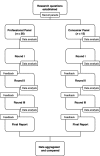Signs and symptoms of disordered eating in pregnancy: a Delphi consensus study
- PMID: 29940882
- PMCID: PMC6019208
- DOI: 10.1186/s12884-018-1849-3
Signs and symptoms of disordered eating in pregnancy: a Delphi consensus study
Abstract
Background: This study aimed to establish consensus on the expression and distinction of disordered eating in pregnancy to improve awareness across various health professions and inform the development of a pregnancy-specific assessment instrument.
Methods: A three-round modified Delphi method was used with two independent panels. International clinicians and researchers with extensive knowledge on and/or clinical experience with eating disorders formed the first panel and were recruited using structured selection criteria. Women who identified with a lived experience of disordered eating in pregnancy formed the second panel and were recruited via expressions of interest from study advertising on pregnancy forums and social media platforms. A systematic search of academic and grey literature produced 200 sources which were used to pre-populate the Round I questionnaire. Additional items were included in Round II based on panel feedback in Round I. Consensus was defined as 75% agreement on an item.
Results: Of the 102 items presented to the 26 professional panel members and 15 consumer panel members, 75 reached consensus across both panels. Both panels clearly identified signs and symptoms of disordered eating in pregnancy and endorsed a number of clinical features practitioners should consider when delineating disordered eating symptomatically from normative pregnancy experiences.
Conclusion: A list of signs and symptoms in consensus was identified. The areas of collective agreement may be used to guide clinicians in clinical practice, aid the development of psychometric tools to detect/assess pregnancy-specific disordered eating, in addition to serving as starting point for the development of a core outcome set to measure disordered eating in pregnancy.
Keywords: Antenatal; Definition; Delphi; Disordered eating; Distinction; Eating disorders; Pregnancy.
Conflict of interest statement
Ethics approval and consent to participate
This study was approved by the Bond University Human Research Ethics Committee (#15278). All procedures performed in studies involving human participants were in accordance with the ethical standards of the institutional research committee and with the 1964 Helsinki declaration and its later amendments. Written informed consent was obtained from all individual participants included in the study.
Competing interests
The authors declare that they have no competing interests.
Publisher’s Note
Springer Nature remains neutral with regard to jurisdictional claims in published maps and institutional affiliations.
Figures
Similar articles
-
Consensus on the assessment of disordered eating in pregnancy: an international Delphi study.Arch Womens Ment Health. 2018 Aug;21(4):383-390. doi: 10.1007/s00737-017-0806-x. Epub 2017 Dec 16. Arch Womens Ment Health. 2018. PMID: 29249043
-
Adaptation of mental health first aid guidelines for eating disorders for Iran.BMC Psychiatry. 2024 Sep 16;24(1):616. doi: 10.1186/s12888-024-06030-5. BMC Psychiatry. 2024. PMID: 39285349 Free PMC article.
-
Identifying research priorities in eating disorders: A Delphi study building consensus across clinicians, researchers, consumers, and carers in Australia.Int J Eat Disord. 2020 Jan;53(1):31-40. doi: 10.1002/eat.23172. Epub 2019 Sep 30. Int J Eat Disord. 2020. PMID: 31571252
-
Development of mental health first aid guidelines on how a member of the public can support a person affected by a traumatic event: a Delphi study.BMC Psychiatry. 2010 Jun 21;10:49. doi: 10.1186/1471-244X-10-49. BMC Psychiatry. 2010. PMID: 20565918 Free PMC article. Review.
-
Consensus criteria for the diagnosis of scabies: A Delphi study of international experts.PLoS Negl Trop Dis. 2018 May 24;12(5):e0006549. doi: 10.1371/journal.pntd.0006549. eCollection 2018 May. PLoS Negl Trop Dis. 2018. PMID: 29795566 Free PMC article.
Cited by
-
History of pre-pregnancy maternal symptoms of binge eating and childhood behavioral problems in girls and boys.Int J Eat Disord. 2022 Nov;55(11):1565-1574. doi: 10.1002/eat.23783. Epub 2022 Jul 20. Int J Eat Disord. 2022. PMID: 35855598 Free PMC article.
-
The applicability of the Eating Disorder Inventory in pregnancy.Eat Weight Disord. 2022 Mar;27(2):629-637. doi: 10.1007/s40519-021-01197-2. Epub 2021 May 7. Eat Weight Disord. 2022. PMID: 33961273 Free PMC article.
-
Elite athletes get pregnant, have healthy babies and return to sport early postpartum.BMJ Open Sport Exerc Med. 2019 Nov 21;5(1):e000652. doi: 10.1136/bmjsem-2019-000652. eCollection 2019. BMJ Open Sport Exerc Med. 2019. PMID: 31803497 Free PMC article.
-
At the Same Table: A Delphi Consensus-Based Model of Health-Promoting Eating Behaviors.Nutrients. 2023 Aug 17;15(16):3601. doi: 10.3390/nu15163601. Nutrients. 2023. PMID: 37630790 Free PMC article.
-
Effect of social media use on the orthorexia nervosa tendency among pregnant women.Pak J Med Sci. 2025 Jun;41(6):1755-1762. doi: 10.12669/pjms.41.6.12008. Pak J Med Sci. 2025. PMID: 40621537 Free PMC article.
References
-
- American Psychiatric Association . Diagnostic and statistical manual of mental disorders. 5. Arlington: American Psychiatric Publishing; 2015.
-
- National Eating Disorders Collaboration . Disordered eating and dieting. 2017.
MeSH terms
Grants and funding
LinkOut - more resources
Full Text Sources
Other Literature Sources
Medical



